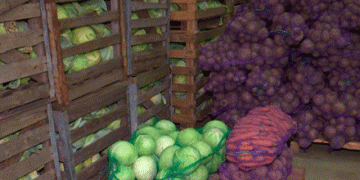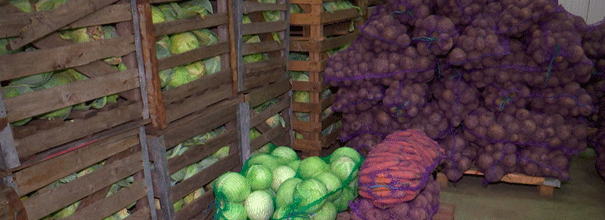The agricultural landscape in Belarus is gearing up for the winter as stabilization funds, a cornerstone of the nation’s food security, are completed across the country. By preserving a substantial share of the year’s harvest, these funds ensure that high-quality, locally grown fruits and vegetables remain available and affordable through the challenging winter months until May.
A Goal to Support National Food Security
The main mission of these stabilization efforts is to supply fresh produce to Belarusians year-round. This is especially critical as fresh, homegrown vegetables and fruits are in high demand, not only in households but also in schools, kindergartens, hospitals, and other social institutions. According to the Ministry of Agriculture and Food of Belarus, more than 120,000 tons of fruits and vegetables have been earmarked for long-term storage this year. This includes staple items such as apples, table beets, carrots, cabbage, and potatoes.
Achieving Impressive Yields Despite Challenges
This year has not been without agricultural difficulties. For example, in the “Mozheikovo” agricultural enterprise, early-season weather conditions posed a threat. When planting began, there was a significant lack of moisture, which initially worried agronomists. However, timely rainfall helped ensure a strong harvest. The table beet crop was a particular highlight, achieving yields of over 400 quintals per hectare, a remarkable accomplishment that underscores the adaptability and resilience of the region’s farming practices.
Efficient Sorting and Storage Techniques
In the facilities of “Mozheikovo,” carrots are currently being sorted with great care. Workers efficiently separate high-quality carrots for long-term storage, while the rest are packed for immediate sale. The sweet, robust carrots are a favorite among consumers and hold great value for nutrition, especially during the off-season. Fruits and vegetables are carefully stored in three specialized facilities, with around 20% of the overall harvest designated for the stabilization fund.
Natalya Yasyukevich, a horticulturist at “Mozheikovo,” emphasizes the importance of these efforts. “We package our carrots for retail in nets. Our carrots are well-loved for their sweetness and versatility, which makes them especially valuable in the off-season,” she says. This sentiment reflects a broader recognition of the nutritional value of local produce, particularly in the colder months when fresh options are limited.
Innovations for Year-Round Availability
The Ministry of Agriculture and Food is also planning future advancements in storage technology. Deputy Minister Vladimir Grakun explained that one key goal is to address the gap in Belarusian apple availability from May to July. “We aim to build new storage facilities with controlled gas environments within the next two to three years. This will help extend the storage life of our apples and ensure a steady supply until the new harvest,” he noted.
These efforts are part of a larger initiative to minimize the seasonal scarcity of locally grown fruits. By developing these advanced storage solutions, the ministry seeks to guarantee that high-quality, domestic produce is always available, reducing reliance on imports and keeping prices stable.
Belarus’ efforts to complete stabilization funds for the off-season are a testament to the strength and organization of its agricultural sector. With over 120,000 tons of vitamin-rich produce secured, the nation is well-prepared to meet consumer demands and support social institutions through the colder months. Continuous innovation in storage techniques promises to further enhance the availability of fresh, high-quality, local produce, making sure that “Made in Belarus” remains a mark of quality and reliability.































